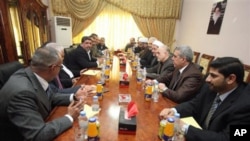Iraqi politicians say once again they are close to forming a new government, seven months after inconclusive elections. Lawmakers have had to contend with sectarian and ethnic differences, regional and international interference, and there are yet more hurdles to come.
The long delay in putting a government together has taken a toll. Key legislation is stalled, foreign investment is largely on hold and sectarian tensions appear to be again on the rise.
Iraqi voters, who braved the violence to take part in the March elections, have expressed frustration that politicians have been unable or unwilling to put aside their differences. But in recent days, there have been signs that some have.
Anti-American Shi'ite cleric Moqtada al-Sadr has quashed his disdain for Prime Minister Nouri al-Maliki to back him for another term, at least temporarily. And others, including the leader of the Supreme Islamic Council, Ammar al-Hakim, may be moving closer to doing the same.
Political system
International Crisis Group Senior Analyst Peter Harling says what makes it so difficult to form a government is the way the political system has been designed.
"There is no role for the opposition," he said. "You are either in or irrelevant. So everyone has decisive stakes and I think that explains probably why Ammar el-Hakim, for example, who opposed the nomination of Maliki as prime minister will, in the days to come, shift his own stance. Anybody left out loses everything. So that makes it very difficult to find a formula in which everyone has a stake."
Inside Iraq, those trying to carve out a place for themselves include Hakkim and Sadr's Shi'ite National Alliance, Mr. Maliki's Shi'ite State of Law coalition, and Kurdish lawmakers who could play a key swing role. And then there is the top seat-getter in the election - the secular, Sunni-backed Iraqiya bloc of Shi'ite former prime minister Ayad Allawi.
Redifining roles
Harling says the delay in forming a government has favored Mr. Maliki, much to the concern of his rivals. "Maliki has taken a head start in terms of imposing his authority over the security apparatus and I think that has generated huge concern within Iraqiya, but I think also in other quarters, I think Maliki has succeeded in rallying many players in Iraq, both domestically and internationally against him. So it is very much now an issue of how the powers of the prime minister will be redefined," he said.
With the apparent need to include everyone to get a government going, the question now becomes not just redefining the role of the prime minister, but also the president and such key ministers as oil and security. One of the ideas being floated is to boost the powers of the president, now a largely ceremonial post held by a Kurdish leader Jalal Talibani. Others cover how to draw Iraqiya and its strong Sunni support, up to now resistant, into the fold.
But the idea of dividing up positions in the government to accommodate various constituencies, in the style of Lebanon, has its drawbacks.
"If they are going to argue over the Cabinet regarding which sect will get the most important portfolio and which sect has fewer population should get a weaker and less influential portfolio, then we are going to have a sectarian Iraq and not a modern, democratic state like what the Americans wanted - a democratic state that is above the sects and traditional loyalties and tribalism and clannish minds," said Said Sadek, a professor at the American University in Cairo.
"So I hope they do not argue over which sect should be represented and which sect should take what portfolio. Let the best man win because this is in the interest of Iraq," he added.
Regional, international interference
But Sadek argues the internal differences pale in comparison to the role played by external forces. He says that since the American invasion in 2003, the United States, Iran, Saudi Arabia, and Syria have felt a need to help establish an Iraq that would serve their purposes.
"Even despite the fact that, on the surface, America and Iran are at loggerheads, there is a lot of understanding on the situation in Iraq. Both sides do not want an explosion. It is in the interest of everybody that this sectarian bomb is shut down and closed and contained," said Sadek.
The desire to finally have a leader emerge and get the first part of the process underway can be seen in the flurry of recent diplomatic overtures from U.S., Iranian and Syrian envoys. Tehran's desire for stability is widely believed to have been translated into pressure on the Iran-based Sadr to throw his support to Maliki. And a functioning government, even one with such enemies as Sadr, will make it easier for the United States to complete its troop withdrawal by the end of next year.




